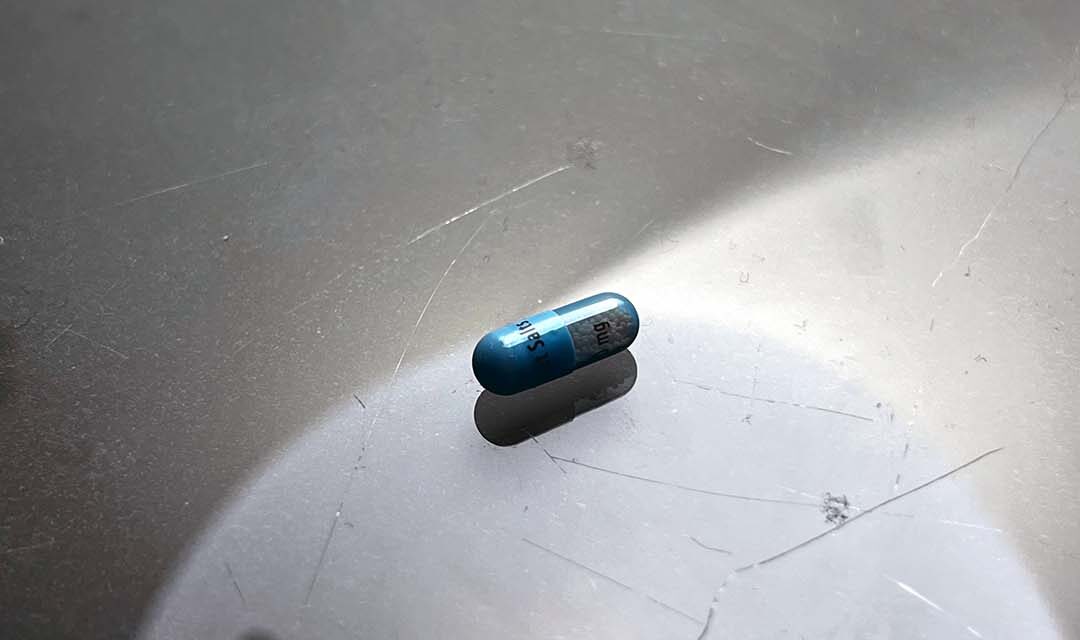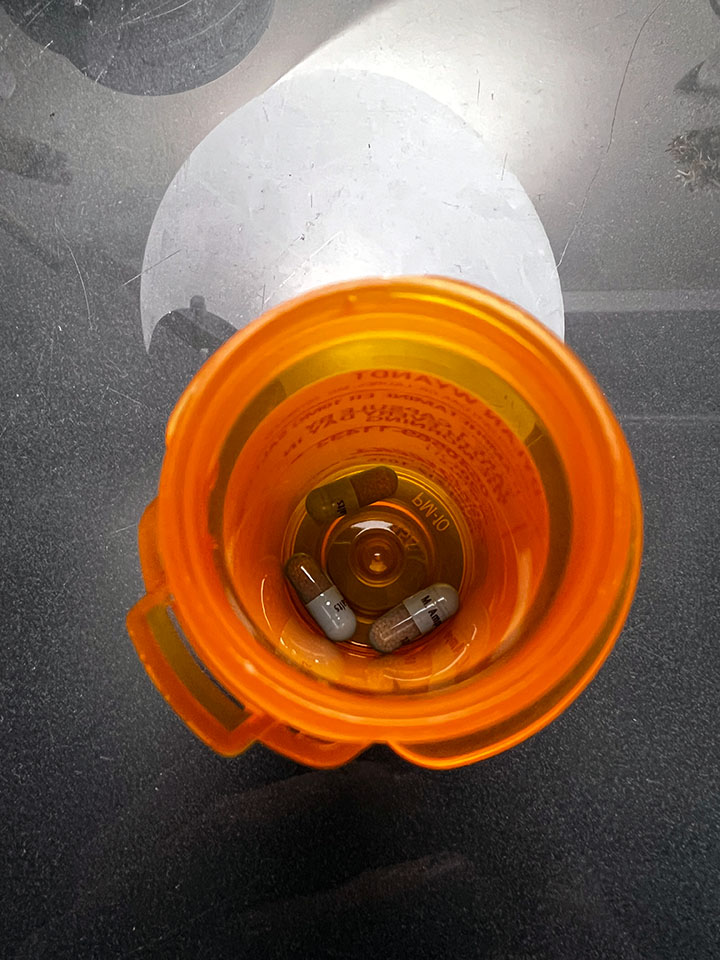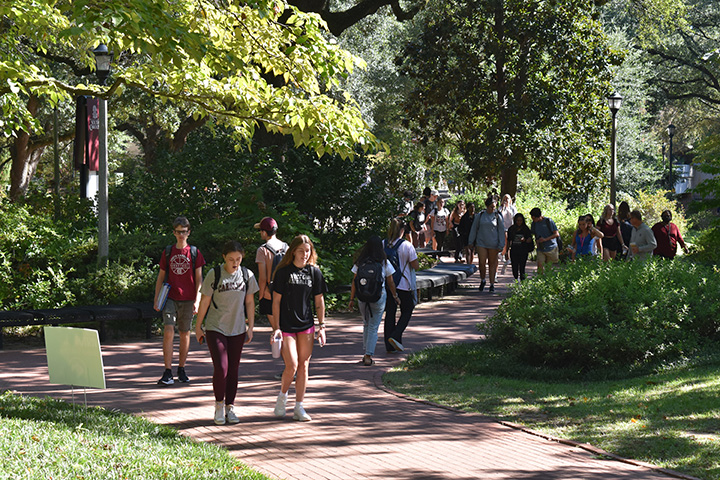A 25 mg capsule of Vyvanse (Photo by Langston Brooks/Carolina News & Reporter)
On a Sunday evening in an off-campus house near the University of South Carolina, a senior, “Lucky,” sits on his couch with his roommates, watching football and occasionally taking hits from his bong.
He was waiting for his 5:30 appointment with another college student, who Lucky says comes every two weeks for his usual pickup – seven pills of 30 mg Vyvanse for $50.
“Bet. I’m sending the Venmo to you now,” a skinny, 5-foot-7-inch sophomore said as he walked into the living room.
“I might come back in a couple of days to get more for this weekend,” he said.
Lucky and other USC students have profited from selling their personal attention deficit hyperactivity disorder medication to students. Lucky agreed to an interview on the condition of anonymity, concerned that making his name public could lead to legal trouble.
Dr. Felicia Heyward serves as a nurse practitioner at The Integrated Wellness Center in Sumter and works to promote optimal mental health through psychotherapy, medication management and other services.
“Unfortunately stimulant medication is really on the front burner for a lot of regulatory agencies, because people are out there selling it,” Heyward said.
Heyward said the medication, a stimulant, should only be used for medical needs by people with ADHD. It’s problematic for those who abuse it.
“They get hooked on it, and they like feeling, like, they can just go, and it’s really not supposed to be used like that,” Heyward said.
Prescriptions of choice
Around campus, Lucky said, the two most popular forms of prescription drugs for sale are Adderall and Vyvanse.
He sells half his monthly prescription of 30 capsules for $6 each.
“In a month, I would say I gain around a $90 to $100 profit from selling my extra capsules,” Lucky said. “I would say more people like Vyvanse, in my opinion, because it is a more relaxed stimulant.”
Lucky’s customers are mostly friends and college students he connects with in GroupMe chats.
“I could, literally, send a text in any group chat and sell out in a day,” Lucky said.
“Throughout my four years here, the drug demand for studying or preparing for an exam has always stayed consistently high,” he said. “So, it’s an environment (where) everybody can eat or flourish.”
“People get addicted to the medication because of the productivity and overall optimism on life you receive from taking it,” Lucky said. “My main customer is pretty much addicted to anything that is a stimulant.”
One student who takes the prescription drug recreationally said he has seen the effects of addiction among others, but that hasn’t slowed his usage of what he and his friends call “study Skittles.”
“To me, when taking Vyvanse, I feel euphoric, super energized, motivated, and all around (and have) a sense of over-achievement,” said “Peter,” a USC junior who also agreed to an interview on the condition of anonymity.
His first time taking one of the popular drugs was during his freshman year when he was studying for exams. He then started taking them while going out at night.
“I would say, during a month, I usually take Vyvanse about three to five times when going out,” Peter said. “It gives me a surge of energy and allows me to drink at a faster pace.”
To get the drug into his system, he usually takes it with water. But his favorite way is to snort the substance, making it hit quicker and giving him a “smack in the face,” he said.
“One of my main reasons for enjoying this drug is that, to me, it is the perfect substitute to other stimulants and drugs,” Peter said. “There is no hangover effect. And I honestly wake up and feel great in the morning.”
When speaking on the negative effects, though, the junior was quick to talk about one of his hometown friends who took the drug recreationally and changed for the worse in just a year’s time.
“These drugs are, no question, 100% addictive,” Peter said. “One of my friends at home took ADHD medication regularly. Then when I came back (home) for winter break, he was a little off.”
“That was a moment for me where, if I see one of my friends going overboard on how many they are taking or the dosage, I have to step in this time and say something,” Peter said. “I just really don’t want to see someone become a whole new person like that again.”
One of the most dangerous components of ADHD stimulants is the addictive properties they can have for individuals taking the drug in a recreational setting.
That’s caused by the stimulants leading to an increase in the neurotransmitter dopamine, which has a strong association with addiction because it affects the brain’s reward center.
Dr. Sunil Bhatia at Psychiatric Connections of Greenville knows about the process behind ADHD stimulants.
“These medications work by increasing the levels of dopamine and norepinephrine in the brain, which can improve attention, focus and impulse control,” Bhatia said.
“These act the same way as amphetamines, so can be abused like anything else that gives pleasure, including food,” he said. “They are sometimes also used as designer drugs for someone to have an edge over others, to focus, concentrate and organize.”
What’s the big deal?
Many college students who deal with these medications do not know the true risk of selling them for a couple of extra dollars.
“For distribution or possession with intent to distribute, you can get up to five years in prison on a first offense,” said A. Randolph Hough, a criminal defense lawyer and former prosecutor in South Carolina.
Hough has practiced law for more than 25 years, including prosecuting federal drug charges as a special assistant United States attorney, and has offices in Columbia and Charleston.
“With college students, the most common thing I see is possession of a controlled substance without a prescription,” Hough said.
“Statistics say an enormous percentage of people on college campuses are taking ADHD medication without a prescription, and typically they’re probably getting them from friends,” Hough said.
Hough said many college students often don’t know how simple it is to be charged with crimes relating to these Schedule II substances.
It’s not just selling the substance that is illegal.
“If you give someone Adderall or Vyvanse, like your friends, and they don’t have a prescription, there is zero doubt you have now committed a crime of distribution of a Schedule II controlled substance,” Hough said.
“Allen,” a USC junior who sells his ADHD medication, said he didn’t realize the legal ramifications.
“I think me and others at the university believe that we just see this as a way of helping other people out for some quick bucks than a dark criminal enterprise,” Allen said.
Allen sells his 40 mg Vyvanse for $10 a capsule, making around $175 per month.
“I increased my dosage about a year ago, and since then, I have been able to charge more for my medicine, since it is a higher dosage than most found around campus,” Allen said. “As long as I keep receiving my prescription, I honestly cannot see myself not selling any leftover capsules I might have.”
As for the future of ADHD medication’s availability on campus, both Lucky and Allen said they don’t think the dealing will end.
“Listen, you will always have a kid diagnosed with ADHD who will always want to find some spare ways to make money on campus,” Lucky said. “I could maybe see the sale of ADHD medication slowing down with constant police enforcement. But the supply and demand aspect will go nowhere.”
Jeff Stensland, assistant vice president of institutional relations and public affairs at USC, said Adderall, if abused, can lead to a host of adverse health effects.
“Selling or giving prescription drugs to people they are not prescribed to can jeopardize the health of students and pose significant legal risks,” Stensland told The Carolina News & Reporter in an email.
He also said there has been at least one verified incident in Columbia in recent years of counterfeit Adderall containing fentanyl, a powerful and potentially deadly opioid.
“If you’re caught distributing Adderall, it’s a felony offense and your life as a Gamecock is likely over,” he said. “So, if the medicine is yours, don’t give it to others. If it’s not prescribed to you, don’t take it. It’s simply not worth the risk.”
Stensland said there are resources available to USC students in the case of life-threatening emergencies.
“USC has free Narcan available to students in case they know someone at risk of an accidental overdose,” he said.
The two most popular brands of illicit ADHD stimulants among USC students are Adderall and Vyvanse. (Photo by Langston Brooks/Carolina News & Reporter)
Students find ADHD stimulants through friends or campus group chats. (File photo/Carolina News & Reporter)
A. Randolph Hough’s Columbia law offices are on Main Street. (Photo by Langston Brooks/Carolina News & Reporter)





